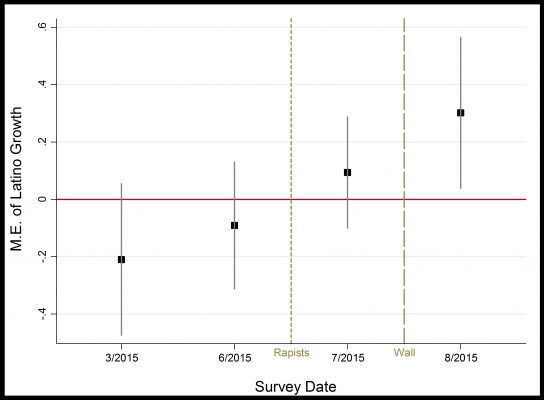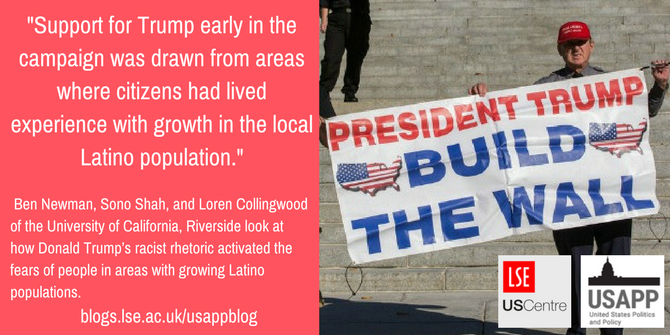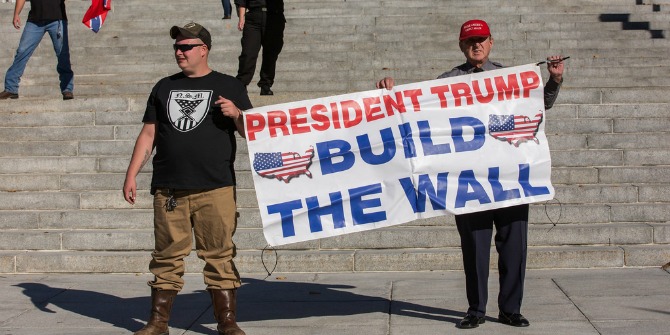

 In the opening salvo of his presidential election campaign in June 2015, Donald Trump referred to Mexican immigrants as “racists” and “criminals”. In new research Ben Newman, Sono Shah, and Loren Collingwood look at how Trump’s racist rhetoric drew support during the election. Using data from survey polls taken during the campaign, they find that Trump’s inflammatory comments activated the latent anti-immigrant sentiments of those who lived in areas which had experienced large increases in their Latino populations.
In the opening salvo of his presidential election campaign in June 2015, Donald Trump referred to Mexican immigrants as “racists” and “criminals”. In new research Ben Newman, Sono Shah, and Loren Collingwood look at how Trump’s racist rhetoric drew support during the election. Using data from survey polls taken during the campaign, they find that Trump’s inflammatory comments activated the latent anti-immigrant sentiments of those who lived in areas which had experienced large increases in their Latino populations.
A prominent feature of Donald Trump’s campaign for president was the use of racially inflammatory rhetoric to leverage fears over immigration—specifically from Mexico—to galvanize the electorate. Key moments in his campaign were his reference to Mexican immigrants as “criminals” and “rapists” and his promise to build a “great wall” along the border and make Mexico pay for it. These statements, from the summer of 2015, were met with significant controversy, as many commentators decried them as explicitly racist.
Nevertheless, Trump’s poll numbers continued to rise in the lead-up to the 2016 primary elections, causing pundits and scholars to search for explanations for Trump’s political ascent. While most explanations focus on voters’ characteristics such as Anglo heritage and lack of education, economic frustration, racial resentment, authoritarianism, and ethnocentrism, the role of environmental factors has been largely overlooked.
Although scholarship has identified fear of immigration and growing minority populations as an important predictor of support for Trump, in new research, we find that that residing in an area which has seen high growth in its Latino population is predictive of support for Trump following, but not before, his inflammatory comments about Mexican immigrants. Our results suggest that, support for Trump—particularly during the early campaign period—represented an adversarial reaction among Americans to Latino-led diversity.
Using survey polling from during Trump’s campaign
We identified four nationally representative surveys conducted by Monmouth University Polling Institute that were conducted during key periods of the Trump Campaign. One survey polled respondents after Trump’s entry as a potential candidate in March 2015 (e.g., his formation of an exploratory committee on March 18) but before his infamous comments about Mexican immigrants. Other polls were conducted at key periods of time following Trump’s campaign announcement speech on June 16, 2015, where he made his “rapists” and “criminals” comment about Mexican immigrants.
Each survey asked Republican respondents whether they held a favorable or unfavorable attitude of Donald Trump, as well as geocodes for respondents’ county of residence and a range of demographic and other control variables, such as disapproval of Obama. Our key independent variable was Latino Growth: the percentage-point increase in a county’s Latino population between 2000 and 2014.
Figure 1 – Effect of Local Hispanic Growth on Favorability of Donald Trump in Nascent Stage of Presidential Campaign (Republicans Only)

The results show that prior to Trump’s issuance of his two most infamous anti-Mexican statements, we do not observe a statistically significant effect of Latino Growth on evaluations of Trump.

“Harrisburg, PA – 20161105-143608” by Paul Weaver is licensed under CC-BY-NC-SA-2.0
However, immediately following the ‘rapists’ comments, we see a positive relationship between Latino Growth and evaluations of Trump (though statistically insignificant). After Trump had made both the “rapists” and the “wall” statements, there is a positive and statistically significant effect of Latino Growth on support for Trump. The results indicate that Latino Growth becomes important for predicting support for Trump after his racially inflammatory rhetoric.
What about economic conditions?
Following Trump’s victory, economic hardship was a common characteristic used to explain the motivations of Trump voters (Sanders press release about Trump Victory, Daily Beast-Oped, CNN-Oped ). Although several studies cast doubt on the importance of economic conditions in Trump’s victory (and in some cases even suggest the opposite), some people still continue to believe that deteriorating economic conditions and economic anxiety played a significant role in Trump’s victory.
We examined whether changes in median income, employment, and manufacturing influenced support for Trump in the early campaign period, but find no evidence that economic conditions motivated Trump’s voters at that time.
Racial narratives and Trump’s success
Our research strongly aligns with many existing racial narratives that explain Trump’s electoral success. However, we also show that support for Trump early in the campaign was drawn from areas where citizens had lived experience with growth in the local Latino population. Trump’s racially inflammatory statements about Mexican immigrants “activated” latent sentiments: respondents residing in a high Latino-growth context were more likely to support Trump only after his racially inflammatory comments.
- This article is based on the paper, ‘Race, Place, and Building a Base: Latino Population Growth and the Nascent Trump Campaign for President’ in Public Opinion Quarterly.
Please read our comments policy before commenting.
Note: This article gives the views of the author, and not the position of USAPP – American Politics and Policy, nor of the London School of Economics.
Shortened URL for this post: http://bit.ly/2rAFhKi
_________________________________________
About the authors
 Ben Newman – University of California, Riverside
Ben Newman – University of California, Riverside
Ben Newman is Associate Professor of Public Policy & Political Science at University of California, Riverside
 Sono Shah – University of California, Riverside
Sono Shah – University of California, Riverside
Sono Shah is a Ph.D. candidate in the Department of Political Science at University of California, Riverside
 Loren Collingwood – University of California, Riverside
Loren Collingwood – University of California, Riverside
Loren Collingwood is Assistant Professor of Political Science at University of California, Riverside




